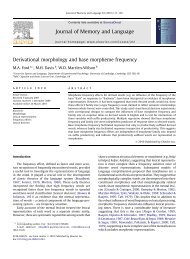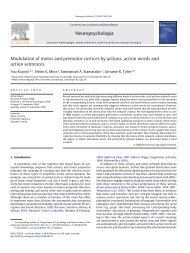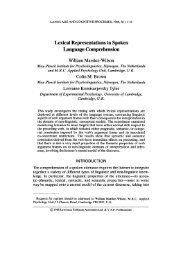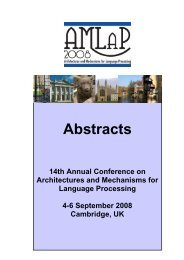Towards a psychological basis for a theory of anaphora - Centre for ...
Towards a psychological basis for a theory of anaphora - Centre for ...
Towards a psychological basis for a theory of anaphora - Centre for ...
Create successful ePaper yourself
Turn your PDF publications into a flip-book with our unique Google optimized e-Paper software.
What the AI literature does provide the<br />
psychologist, at present, is with a series <strong>of</strong> clearly<br />
expressed observations about the kinds <strong>of</strong> in<strong>for</strong>mational<br />
variables that a processing system capable <strong>of</strong><br />
interpreting anaphoric expressions needs to be able to<br />
handle. The most relevant to our present arguments is<br />
the use <strong>of</strong> inferenc'e in AI systems, going back at least<br />
to Charniak's (1972) observations. In fact, much <strong>of</strong> the<br />
subsequent history <strong>of</strong> AI research on <strong>anaphora</strong> can be<br />
seen as an attempt to develop techniques <strong>for</strong> involving<br />
inference in the resolution process that were less<br />
explosively unconstrained than the methods that Charniak<br />
(1972) and Rieger (1974) originally proposed (<strong>for</strong> some<br />
recent treatments, see Hobbs, 1976; 1979; Nash-Webber,<br />
1978; Sidner , 1979 ) .<br />
Sidner (1979), <strong>for</strong> example, presents an interesting<br />
set <strong>of</strong> algorithms centered around the notion <strong>of</strong> "focus"<br />
(c.f., Chafe, 1976; Grosz, 1978; Halliday, 1967) as a<br />
way <strong>of</strong> selecting and ordering the set <strong>of</strong> potential<br />
antecedents <strong>for</strong> an anaphor ic element. As the program<br />
analyses a discourse, it carries along with it a primary<br />
focus element, an ordered list <strong>of</strong> alternative focus<br />
elements, and a stack <strong>of</strong> old foci. This provides the<br />
system with a means <strong>of</strong> determining in what order<br />
#<br />
potential antecedents should be checked when an<br />
anaphoric element is encountered. Thus inferencing<br />
procedures need not be appl ied ind iscr iminately to<br />
all potential antecedents, but rather, in a<br />
predetermined order, to those antecedents (and the<br />
knowledge associated with them in the discourse model)<br />
that have been most salient in the prior discourse.<br />
While one would not expect to translate Sidner's<br />
procedures directly into a <strong>psychological</strong> model, they do<br />
illustrate the potential importance <strong>of</strong> discourse<br />
focussing factors in anaphor resolution, As we have<br />
mentioned elsewhere in this paper, it is likely that<br />
such discourse factors, unlike local lexical factors, do<br />
function <strong>psychological</strong>ly to pre-select potential<br />
anapbors <strong>for</strong> on-line cansideration, even in a device<br />
apparently capable <strong>of</strong> multiple parallel assessment<br />
processes. Sidner' S <strong>for</strong>mulation <strong>of</strong> these discourse<br />
factors would clearly <strong>for</strong>m a useful background to<br />
<strong>psychological</strong> experiments on this issue.<br />
A somewhat different perspective is provided by the<br />
work <strong>of</strong> Hobbs (1976; 1979). His approach is based on<br />
the role <strong>of</strong> "coherence" relations in the understanding<br />
<strong>of</strong> discourse. Speakers produce utterances which cohere<br />
in various ways (c.f ., Halliday & Hasan, 1976) to what<br />
hne baon mid pruvlo~l:lly, rind tho pr lonry g ~ n l <strong>of</strong> t h ~<br />
listener is to discover how this coherence is realised<br />
in the utterance - how what the speaker is saying is<br />
relevant to what has just been said. Hobbs' argument is<br />
that many problems in anaphor resolution will be solved,






